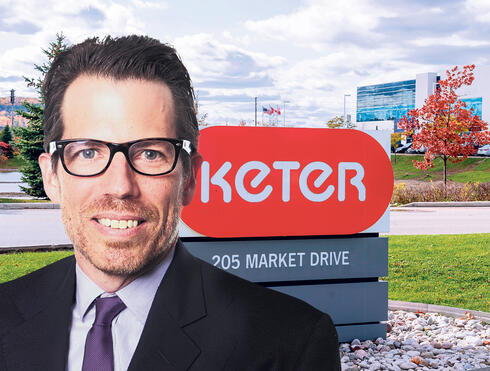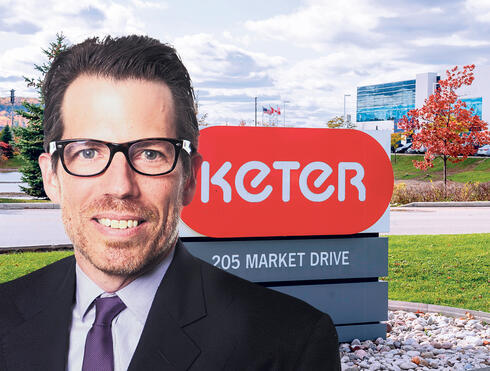
Keter back on the market with 1.2 billion euro price tag
After seven years under the control of BC Partners, the plastic products manufacturer is set to be sold at half its valuation from 2016
After seven years under the control of BC Partners, the plastic products manufacturer, Keter, is back on the market. The company, once a pride of Israeli industry, has failed under the fund's ownership and is now up for sale to address for 1.2 billion euros, which is also the size of its debt. The failures extend to the CEO appointed by BC Partners, Alejandro Pena, who relocated the company's headquarters to the U.S., failed to lead it to an IPO, and struggled to refinance its loans on time. As a result, the company's debtors have made the decision to sell Keter to recover their debts.
BC Partners had acquired Keter through a loan that burdened the company, contributing to its deteriorating business. Now, the fund is putting its entire stake up for sale, and it remains uncertain whether the Sagol family, who still owns 20% of the shares, will participate in the transaction.
Potential buyers interested in the purchase include Israel's Fortissimo Capital, managed by Yuval Cohen, and the international CVC fund. CVC had previously competed with the Sagol family for the acquisition of Keter and held discussions to enter the local retail chain SuperPharm.
The decision to sell indicates the power held by Keter's debtors, including banks and financial institutions, who have grown impatient with the company's shareholders. Keter has until October to repay its entire debt, with the CEO required to present financing solutions even earlier. This situation has given the debt holders leverage to pressure the shareholders to sell the company.
Although the debtors could have extended the repayment date or agreed to a capital injection to reduce the loan, they rejected a proposal of 100 million euros from the shareholders. Consequently, they have chosen to force Keter into a sale. An official bidding process is expected to be announced soon to invite potential buyers to submit offers.
Fortissimo, one of Israel's largest private equity funds, manages $2.7 billion across six funds, including the recent $1.2 billion fund raised last year. The fund mainly invests in technology and industrial sectors, often acquiring control of public and private companies. It recently entered the pharmaceutical field with the acquisition of an 80% stake in CTS for approximately NIS 150 million (approximately $40 million).
In 2016, when the Segol family sold control to BC Partners, the process lasted over two years. Following the sale, the family, who founded the company in 1948, received $1.4 billion while retaining a 20% ownership. BC Partners faced competition from CVC and investment firm Carlyle, with CVC offering a lower amount. It is now possible that CVC may succeed in acquiring the company for a lower sum than their previous bid seven years ago.
Since acquiring control, BC Partners has held Keter as part of its retail portfolio, planning improvement procedures and an IPO on the Nasdaq stock exchange. The CEO, appointed in February 2018, was a foreign candidate who would operate outside of Israel, primarily to lead the company to a successful IPO in the U.S. The IPO was initially planned for September 2021 but was halted due to negative market feedback on the company's valuation. Keter had aimed to raise $500 million in the IPO to repay the debt incurred by BC Partners' purchase at a valuation of $2.5 billion. Subsequently, Pena's attempt to refinance the debt also failed, leading to the current decision to sell the company.
These failures resulted in Moody's downgrading Keter's credit rating from Caa1 to Caa2 last March. The downgrade was due to uncertainty surrounding the completion of the 1.2 billion euros debt restructuring process and the associated challenges.
Since the publication of the prospectus in preparation for the 2021 IPO, Keter, as a private company, has not released its financial reports. However, according to Moody's review from last March, Keter reported revenues of 1.6 billion euros in 2022 and an EBITDA of 167 million euros. Adjusted operating profit decreased to approximately 144 million euros in 2022 compared to 203 million euros in 2021. As of December 2022, the company had sufficient liquidity to finance its ongoing activities, with 63 million euros in liquid capital (cash and cash equivalents), unused credit facilities of 102 million euros, and an additional credit of 31 million euros against future revenues and inventory. Moody's economists noted that the company's liquidity had improved in 2023, but the specific extent of liquid capital was not disclosed. The rating agency expects Keter's leverage against expected debt ratio to decrease from 9.9 times to 8.5 times by the end of 2023.
The biggest loser in these developments, apart from the shareholders, is CEO Pena, who has invested heavily in the company's success. BC Partners is also disappointed as it had expected to use funds from the IPO to partially recoup its investment in the company and reduce the debt. It is now expected to part ways with the company at a lower value than the initial acquisition cost.














